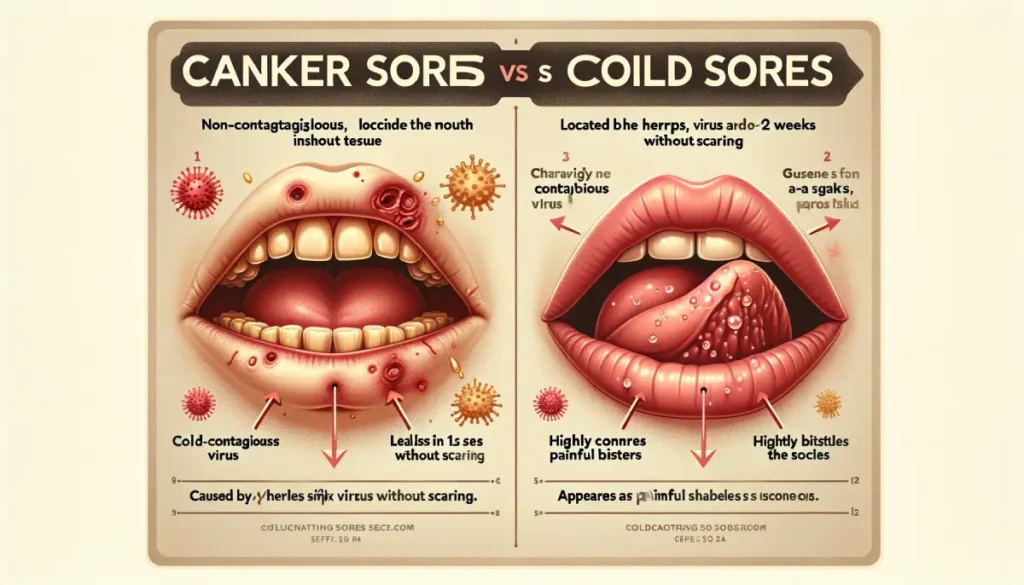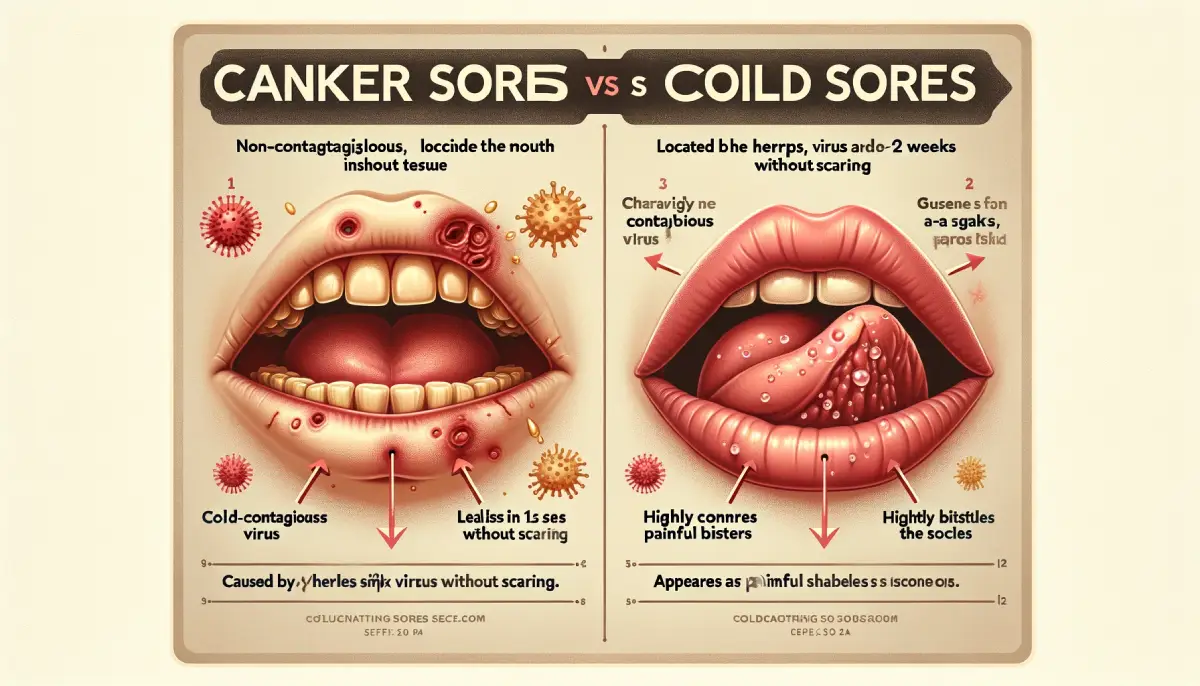Discover key differences in symptoms, causes, and treatments with our guide on Canker Sores vs. Cold Sores, helping you manage these oral conditions effectively.
What Are Cold Sores?
Oral herpes typically isn’t transmitted through sexual contact, unlike genital herpes, which is caused by herpes simplex virus type 2,” states Michael P. Rosenthal, MD, Chief of Family Medicine and a physician at Penn Family Medicine Pennsylvania Hospital. “Instead, oral herpes is usually acquired in childhood or early adulthood through nonsexual contact with infected saliva
Introduction
Regarding oral health issues, both canker sores and cold sores are common afflictions that can cause significant discomfort and concern. Although they might seem similar at first glance, these conditions are distinctly different in their causes, treatments, and health implications. This comprehensive guide will delve deep into the differences between canker and cold sores, offering insights into their features, personal experiences, management costs, pros and cons, and viable alternatives. By the end of this article, you’ll clearly understand which condition warrants more attention and under what circumstances.
Table of Contents
Quick Comparison Canker Sores vs. Cold Sores
For those quickly seeking clarity on “Canker Sores vs. Cold Sores” in 2024: Canker sores, technically known as aphthous ulcers, are non-contagious mouth ulcers that manifest on the soft tissues inside the mouth or at the base of the gums. In contrast, cold sores, also called fever blisters, stem from the herpes simplex virus and are highly contagious. Cold sores typically present as painful blisters on the lips, around the mouth, or face. While the treatment for canker sores primarily revolves around managing discomfort and maintaining good oral hygiene, cold sores usually require antiviral medications to control and mitigate outbreaks. Understanding the differences between these two types of sores is essential for effective management and reducing discomfort.

Features Canker Sores vs. Cold Sores
Canker Sores:
- Location: Inside the mouth on the soft tissues or at the base of the gums.
- Appearance: Small, round, or oval ulcers with a white or yellow center and a red border.
- Duration: Typically heals within 1-2 weeks without scarring.
- Triggers: Often triggered by stress, minor injury to the inside of the mouth, acidic or spicy foods, vitamin deficiencies, hormonal changes, or immune system issues.
Cold Sores:
- Location: On the lips, around the mouth, nose, or cheeks.
- Appearance: Fluid-filled blisters that eventually burst and crust over.
- Duration: Usually resolves within 2-3 weeks; can recur in the same area.
- Triggers: Triggered by factors such as stress, sunlight, fever, fatigue, or other infections that weaken the immune system.
Personal Experience Canker Sores vs. Cold Sores
My experiences with “Canker Sores vs. Cold Sores” have highlighted how disruptive both can be to daily life. Canker sores, while undoubtedly painful, typically respond well to over-the-counter treatments and a diet that avoids spicy or acidic foods. Most of the time, these sores heal within a week or two without leaving any scars. On the other hand, cold sores pose a more significant challenge not only due to their painful nature but also because of their more prominent visibility and the social stigma often associated with the herpes virus. The treatment for cold sores usually involves using antiviral creams or oral medications, which are necessary to accelerate the healing process and decrease the frequency of viral outbreaks. These treatments are crucial for managing symptoms effectively and minimizing the impact of outbreaks on social interactions and personal confidence.
Pricing Canker Sores vs. Cold Sores
The cost of treating canker sores and cold sores can vary:
- Canker Sores: Over-the-counter topical treatments such as creams, mouthwashes, and gels can range from $5 to $20. Prescription medications are rarely needed.
- Cold Sores: Antiviral creams or pills are often prescribed to manage outbreaks. Depending on the medication and insurance coverage, these can cost between $20 to $300.
Pros & Cons Canker Sores vs. Cold Sores
Canker Sores:
- Pros: Treatable with inexpensive over-the-counter options; non-contagious.
- Cons: Recurring sores can indicate other health problems; they are painful, especially when eating, drinking, or talking.
Cold Sores:
- Pros: Treatable with effective antiviral medications; visible signs often prompt quicker treatment.
- Cons: Highly contagious; stigma associated with visible sores; potential for frequent recurrences.
Alternatives Canker Sores vs. Cold Sores
For both conditions, exploring alternatives can provide relief and prevent recurrence:
- Canker Sores: Natural remedies include coconut oil, honey, and baking soda rinses. Supplements such as vitamin B12, folic acid, and iron can help prevent them if nutritional deficiencies cause them.
- Cold Sores: Lysine supplements, lemon balm extract, and reducing stress through yoga or meditation can help manage and reduce outbreaks.
Other Relevant Categories
Preventative Measures:
- Canker Sores: Maintain good oral hygiene, avoid spicy/acidic foods during outbreaks, and use a soft toothbrush.
- Cold Sores: Use sunscreen on the lips, avoid sharing eating utensils or lip products, and manage stress effectively.
Impact on Daily Life: Both canker sores and cold sores can significantly impact daily activities, such as eating, speaking, and social interactions, especially when severe or recurrent.
FAQ: Canker Sores vs. Cold Sores
1. What are the main differences between canker sores and cold sores?
- Answer: Canker sores are non-contagious ulcers that appear inside the mouth. In contrast, cold sores are contagious blisters caused by the herpes simplex virus that usually appear on the lips or around the mouth.
2. Are canker sores and cold sores caused by the same virus?
- Answer: No, canker sores are not caused by a virus, and their exact cause is often unknown, though they may be related to stress, injury, or certain foods. The herpes simplex virus causes cold sores.
3. How can I prevent cold sores from spreading?
- Answer: To prevent the spread of cold sores, avoid direct contact with the sores, do not share personal items like lip balm or utensils, and wash your hands frequently.
4. What are some effective treatments for canker sores?
- Answer: Over-the-counter topical treatments, such as special mouthwashes and topical pastes, can help alleviate the pain and speed healing. Avoiding spicy, acidic, and abrasive foods can also reduce irritation.
5. Are there any home remedies for managing cold sores?
- Answer: Applying ice or a cold compress can reduce swelling and pain. Some people find relief using essential oils like tea tree oil, though these should be used with caution and diluted to avoid skin irritation.
6. Can lifestyle changes reduce the frequency of canker sores or cold sores?
- Answer: Yes, managing stress, improving your diet, and maintaining good oral hygiene can help reduce the frequency of canker sores. Avoiding excessive sun exposure and using lip balm with SPF for cold sores can help prevent outbreaks.
7. When should I see a doctor for canker or cold sores?
- Answer: You should consult a healthcare professional if sores do not heal within two weeks, are unusually large or painful, if you have frequent outbreaks, or if you have immune system problems.
8. Can cold sores lead to other health complications?
- Answer: In rare cases, the herpes virus causing cold sores can lead to other complications, such as herpes keratitis, an eye infection. People with weakened immune systems may also experience more severe complications.
9. How long do both canker sores and cold sores typically last?
- Answer: Canker sores usually heal within one to two weeks, while cold sores can last two to three weeks, depending on the severity and treatment.
10. Can children get canker sores and cold sores?
- Answer: Yes, both canker sores and cold sores can affect children. Cold sores are widespread in children because once infected with the virus, outbreaks can recur throughout life.
Conclusion/Summary: Who is the Winner?
Both can negatively impact one’s quality of life, so neither condition is a “winner”. However, understanding the differences between canker sores and cold sores can help with better personal health management. Canker sores are non-contagious and generally milder, so they are usually less disruptive than cold sores, which require careful management due to their contagious nature and potential for recurrence. Tailored treatment and preventive strategies for each condition can ensure better outcomes and less discomfort. If you frequently suffer from either, it’s advisable to consult a healthcare provider to explore underlying causes and appropriate treatments.





